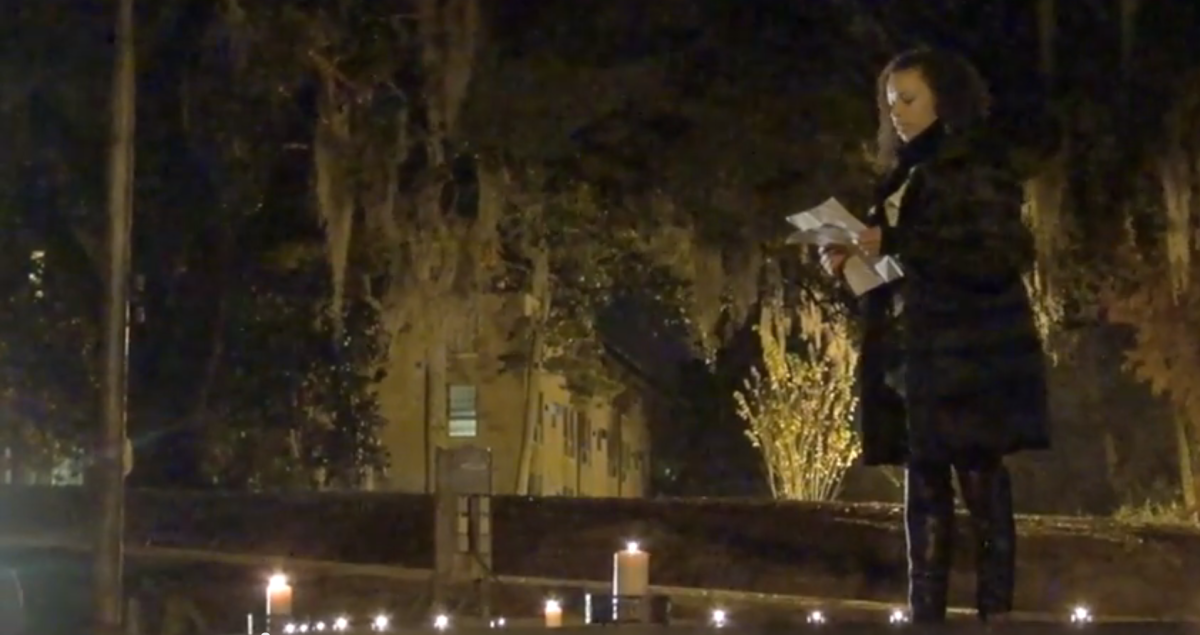In wake of the grand jury verdict in Ferguson, Missouri, University students remembered Michael Brown and others who have suffered from police brutality.
Dialogue on Race Louisiana held a forum and vigil in the Student Union to open dialogue and discussion about the police, race and safety. Other University students organized a separate vigil held in the Greek Theatre to mourn the lives lost to police brutality and discuss a solution to race related issues.
Speakers at the vigil included NAACP-Louisiana legal counsel Alfreda Tillman Bester, University homecoming king Bradley Williams and Qroma president Megan Gilliam.
Similar to DORL’s vigil, public administration graduate student Peter Jenkins organized a vigil for students following the grand jury decision for former Officer Darren Wilson, who shot Brown. Jenkins was astonished when 250 people filled the Greek Theatre, since he planned it 22 hours in advance.
“I felt that it was time to come together and mourn for the lives lost and try to figure out if there’s a way we can move forward more successfully than the communities have done in the past,” Jenkins said.
The names of 61 individuals who have been killed by police or in police custody were read aloud in the Theatre, after the floor was open for audience members to speak.
Maxine Crump, director of Dialogue on Race Louisiana, said organized conversations are vital for change.
“It’s very good for the community to be involved in interactive, organized vigils and to be in conversation like this,” Crump said. “The reason we’re still so ladened with issues of race is because we don’t talk about it.”
Crump said she believes talking begins the process of healing, and if people have an open mind and discuss the issues in a creative listening space, progress can take place.
Crump said the forum, Youth Matters, addressed the age group most often targeted by police, 14- to 28-year-olds.
Crump said DORL created a relaxed environment where youth know how to communicate best. Teens and adults alike toured booths and information tables instructing them on how to be active and seek out change while a DJ played music and later three poets performed.
Then, participants were separated into groups with an adult facilitator and a youth leader. Youth leaders were given three topic questions where they opened dialogue and chose the strongest answer from the group.
The forum also allowed students to engage in conversation about the situation in Ferguson, Missouri. The groups watched a video by Fusion network on Ferguson and responded with their thoughts on the situation, Crump said.
Small groups of participants discussed how the issues Ferguson raises can apply to their own community and brainstormed potential solutions for similar situations.
“Boy, it was powerful,” Crump said. “I was blown away.”
Crump said she expected the youth leaders to stand up and simply read from their papers. Instead, each leader was passionate about the topic and invested in the forum. The forum showed young people want to speak up, as the most common solution was to talk more about the issue of race and police brutality.
The Baton Rouge community supported the forum as the police chief, district attorney, school board president, assistant school board president, two school board members and a representative from the mayor’s office all expressed support or attended the event.
Following the forum, DORL held a vigil for the people and places most affected by police brutality and racial distinction.
“I offered a candlelight moment for them to just be quiet and confirm for themselves their commitment to all of this and to their community,” Crump said.
Both Crump and Jenkins believe the protests in Ferguson and across and the country are effective.
“So many movements in our nation’s history have been born through protests and riots and unfortunately violence as well,” Jenkins said.
He said he hopes the protests make a difference but believes not enough time has passed for their effectiveness to be measured.
Crump is also worried these efforts will be forgotten.
“I think, though, it has to evolve and it has to sustain because we’re a 24 hour news cycle world today, and something else will soon take precedence over it,” Crump said.
She said the Civil Rights movement was successful because it held the attention of the country for a decade. However, she said she does not think this issue needs to last for 10 years.
“Maybe it needs to sustain itself fully in a constant way until it catches on in a meaningful way so we can start solving this problem,” Crump said.
Students, community members rally around Ferguson verdict
November 30, 2014
More to Discover








